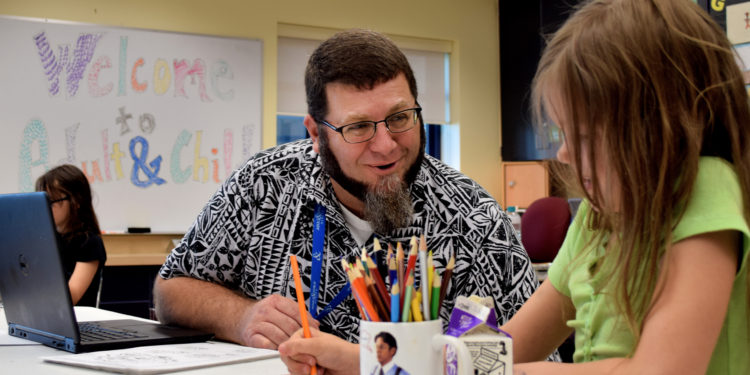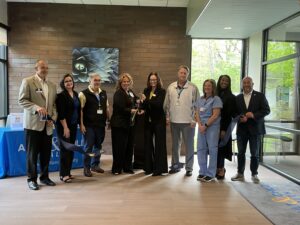The philosophy of School Based is simple: problem kids are not bad kids, they’re kids who simply need more support. This is the very sentiment Skills Development Specialist Chad Ridge tries to embody daily as he winds through the halls of Grassy Creek Elementary throwing out high fives to children passing in lines and advice to ‘make better choices’ to those working at ‘time out desks’ in the hallway.
As a Skills Development Specialist, Chad has a unique but oft necessary position in the school. He helps kids on his caseload work through issues such as ADHD, Oppositional Defiant Disorder, a tendency to flee, a tendency to hit. Therapists on the team do the hard, emotional work with the kids one-on-one to help them address what they feel and why they feel it. Skills Development Specialists (SDS) work with the kids on their actions and how to make better behavioral choices, both in one-on-one sessions and in the classroom. “You kind of have to play a little dance with your caseload,” said Chad, referencing the relatively unstructured day-to-day operations of a Skills Development Specialist. There are a certain number of meetings they must have with their clients per week depending on their level of need, but the landscape always seems to be changing. The caseload rotates slowly, but teachers have different preferences, schedules for extra activities blend and shift, a client may have an outburst in the morning, or an emergency might pop up in the afternoon. Chad manages by staying flexible and spending his day weaving in and out of classrooms, talking with teachers and dropping in on clients to assess the needs of the day. “You have to feel out who needs what at what time and adjust accordingly.”
Kids usually end up on the School Based caseload through a teacher recommendation. Teachers approach parents about working with Adult and Child to help their child tackle behavioral issues. Often the option is discussed when working out Individualized Education Plans. When a child is added to the caseload, a team will take around 30 days to really get to know them. They asses the child’s struggles and develop an individually tailored plan with goals to work on. This happens through classroom observation, discussions with parents and teachers, and familiarizing the child with the School Based team. After 30 days, the SDS will confer about their findings with a psychologist who will provide their own feedback, and then the intensive work begins.
SDSs will often work through storybook-type models that encourage children to examine their own behavior. Titles like “Jake the Frog Settles Down” and “Hunter and His Amazing Remote Control” are designed to illustrate what it looks like to use self behavior modification skills through the example of cheerful cartoon characters. An SDS will also spend time with their clients in the classroom, physically sitting beside them and helping to navigate different types of stimulation, distraction, emotions, etc. One other important piece of the School Based puzzle is parent interaction. When parents sign up their child, they also sign up themselves. Chad says that he usually meets with parents twice a month both to discuss their child’s progress and to involve them in the curriculum. “My work with parents and their children looks a lot like play,” said Chad. He says he often plays games to model and facilitate new types of parent-child interaction individualized to the child’s struggles. “If parents are on board and they’re actively involved in the child’s therapy or skills, then it goes a lot smoother and you move a lot faster toward a graduation or resolution.”
The ultimate goal of School Based is graduation from the program. Once a child is consistently meeting their goals with less and less support from the team, that’s when it’s time to transition them out of the program. Chad has worked in School Based for over a decade and has seen so many kids work through their behavioral problems and function well in school. “School Based works,” he said simply. “We’re there for the kids when they need us.” Supplying that line of defense helps children who might otherwise escalate their behavior so much that it leads to expulsion, a consequence where nobody’s happy and nobody’s learning. But with School Based interaction, Chad has seen that happen much less frequently, a factor that drives his passion for working with kids. “I wouldn’t work anywhere else,” he said, “I love it to pieces.”






